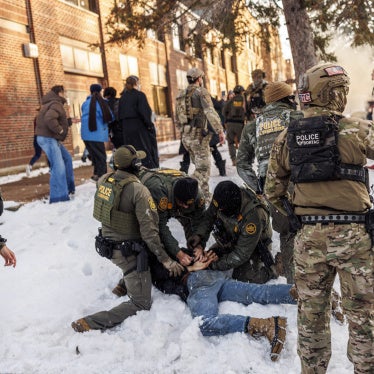Three notorious African leaders -- Zimbabwe's Robert Mugabe, Eritrea's Isaias Afewerki, and Sudan's Omar al-Bashir -- are not invited to this week's U.S.-Africa Leaders Summit in Washington, D.C. But a number of other long-ruling African strongmen, like Angola's José Eduardo dos Santos, Equatorial Guinea's Teodoro Obiang Nguema Mbasogo, and Uganda's Yoweri Museveni, will be there. In fact, over a dozen African countries which will be represented at the summit boast disturbing human rights records of ruthlessly suppressing freedom of expression and freedom of association through harassment, arrest, torture, and trumped up charges and killings.
As President Barack Obama said in an inspiring speech in Accra, Ghana, five years ago, the continent's future is up to Africans, and "Africa needs strong institutions, not strongmen." Like most other African activists, I hoped the United States would recalibrate its security partnership with autocratic African strongmen. I hoped it would follow a balanced policy towards the continent, with development, security, and governance as core pillars, each holding equal sway. Freedoms of expression, association, and peaceful assembly underpin the ability of citizens to exercise so many other rights and hold their own governments accountable. These rights -- prized not only in the United States but by millions of Africans -- must be at the center of Washington's message to Africa's leaders.
But a closer look at U.S. policy and practice in Africa shows that Washington too often prioritizes security and trade at the expense of good governance and respect for human rights. Take Angola, where for over 30 years President José Eduardo dos Santos has wielded criminal prosecutions, arbitrary arrests, and a brutal police force to silence the media and public and enforce his rule, while Washington remains almost exclusively focused on Angolan oil.
Or look at my own country, Ethiopia, where only weeks ago, three journalists and seven bloggers were charged with "terrorism" for allegedly conspiring to overthrow the government. They are simply the latest victims of a decade-long crackdown on political opponents, nongovernmental groups, peaceful protesters, and media that dare to even mildly criticize the policies of the ruling party. Meanwhile, the U.S. administration focuses on its security alliance with Ethiopia for its fight against terrorism in Somalia.
Under Paul Kagame, Rwanda has effectively silenced political opposition and independent criticism through a litany of arrests, disappearances, and killings of political opponents and journalists both at home and in exile. Meanwhile, neighboring Burundi recently marked a new low by imposing a life sentence on opposition party members and alleged supporters, among others, in a blatantly unfair one-day trial.
Uganda, another country whose president, Yoweri Museveni, has been in power for decades, has increasingly cracked down on independent media and nongovernmental organizations, particularly at a time when they are reporting allegations of state corruption and financial mismanagement. And Teodoro Obiang Nguema Mbasogo of oil-rich Equatorial Guinea celebrated his 35th anniversary in power on August 3 by traveling to Washington for the summit, while illegal arrests, torture, and high-level corruption continue back home.
Even in Nigeria, which has for years boasted a strong, free press and active independent groups, there are signs of slippage as soldiers have carried out campaigns to intimidate and harass some media organizations for reporting on corrupt practices in the military. Nigerian authorities defended this brazen intimidation as a routine security operation when soldiers intercepted and destroyed the deliveries of several national newspapers in May and June. On top of this, a new draft law presented to parliament threatens to cut foreign funding for nongovernmental organizations.
In the Gambia, a series of repressive laws has led to the intimidation and imprisonment of journalists and human rights defenders for exercising their rights to freedom of expression and association. Some have been forcibly disappeared.
So it's particularly alarming that this summit will not give human rights and governance a prominent role, and that activists will remain on the outside looking in at a time when independent voices are under sustained attack in so many African countries.
If the U.S. government truly wants to support stable and prosperous African partners, then this summit should pay more than just lip service to human rights and good governance.






